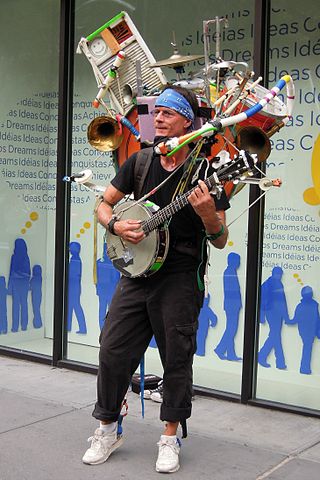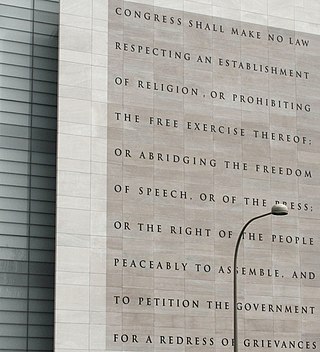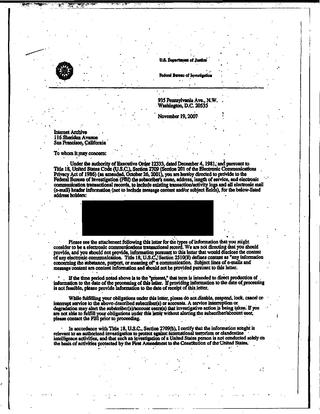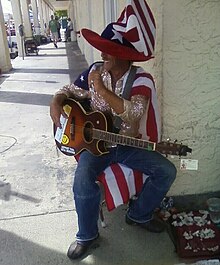
The Americans with Disabilities Act of 1990 or ADA is a civil rights law that prohibits discrimination based on disability. It affords similar protections against discrimination to Americans with disabilities as the Civil Rights Act of 1964, which made discrimination based on race, religion, sex, national origin, and other characteristics illegal, and later sexual orientation and gender identity. In addition, unlike the Civil Rights Act, the ADA also requires covered employers to provide reasonable accommodations to employees with disabilities, and imposes accessibility requirements on public accommodations.

The First Amendment to the United States Constitution prevents the government from making laws respecting an establishment of religion; prohibiting the free exercise of religion; or abridging the freedom of speech, the freedom of the press, the freedom of assembly, or the right to petition the government for redress of grievances. It was adopted on December 15, 1791, as one of the ten amendments that constitute the Bill of Rights.

Street performance or busking is the act of performing in public places for gratuities. In many countries, the rewards are generally in the form of money but other gratuities such as food, drink or gifts may be given. Street performance is practiced all over the world and dates back to antiquity. People engaging in this practice are called street performers or buskers. Buskers is not a term generally used in American English.

The Omnibus Crime Control and Safe Streets Act of 1968 was legislation passed by the Congress of the United States and signed into law by President Lyndon B. Johnson that established the Law Enforcement Assistance Administration (LEAA). Title III of the Act set rules for obtaining wiretap orders in the United States. The act was a major accomplishment of Johnson's war on crime.
The Child Protection and Obscenity Enforcement Act of 1988, title VII, subtitle N of the Anti-Drug Abuse Act of 1988, Pub. L.Tooltip Public Law 100–690, 102 Stat. 4181, enacted November 18, 1988, H.R. 5210, is part of a United States Act of Congress which places record-keeping requirements on the producers of actual, sexually explicit materials. The implementing regulations, part of the United States Code of Federal Regulations, require producers of sexually explicit material to obtain proof of age for every model they shoot and retain those records. Federal inspectors may inspect these records at any time and prosecute violations.

In the United States, freedom of speech and expression is strongly protected from government restrictions by the First Amendment to the U.S. Constitution, many state constitutions, and state and federal laws. Freedom of speech, also called free speech, means the free and public expression of opinions without censorship, interference and restraint by the government The term "freedom of speech" embedded in the First Amendment encompasses the decision what to say as well as what not to say. The Supreme Court of the United States has recognized several categories of speech that are given lesser or no protection by the First Amendment and has recognized that governments may enact reasonable time, place, or manner restrictions on speech. The First Amendment's constitutional right of free speech, which is applicable to state and local governments under the incorporation doctrine, prevents only government restrictions on speech, not restrictions imposed by private individuals or businesses unless they are acting on behalf of the government. The right of free speech can, however, be lawfully restricted by time, place and manner in limited circumstances. Some laws may restrict the ability of private businesses and individuals from restricting the speech of others, such as employment laws that restrict employers' ability to prevent employees from disclosing their salary to coworkers or attempting to organize a labor union.
Student rights are those rights, such as civil, constitutional, contractual and consumer rights, which regulate student rights and freedoms and allow students to make use of their educational investment. These include such things as the right to free speech and association, to due process, equality, autonomy, safety and privacy, and accountability in contracts and advertising, which regulate the treatment of students by teachers and administrators. There is very little scholarship about student rights throughout the world. In general most countries have some kind of student rights enshrined in their laws and proceduralized by their court precedents. Some countries, like Romania, in the European Union, have comprehensive student bills of rights, which outline both rights and how they are to be proceduralized. Most countries, however, like the United States and Canada, do not have a cohesive bill of rights and students must use the courts to determine how rights precedents in one area apply in their own jurisdictions.
Dickerson v. United States, 530 U.S. 428 (2000), upheld the requirement that the Miranda warning be read to criminal suspects and struck down a federal statute that purported to overrule Miranda v. Arizona (1966).

A national security letter (NSL) is an administrative subpoena issued by the United States government to gather information for national security purposes. NSLs do not require prior approval from a judge. The Stored Communications Act, Fair Credit Reporting Act, and Right to Financial Privacy Act authorize the United States government to seek such information that is "relevant" to an authorized national security investigation. By law, NSLs can request only non-content information, for example, transactional records and phone numbers dialed, but never the content of telephone calls or e-mails.
Turner Broadcasting System, Inc. v. FCC is the general title of two rulings of the United States Supreme Court on the constitutionality of must-carry regulations enforced by the Federal Communications Commission on cable television operators. In the first ruling, known colloquially as Turner I, 512 U.S. 622 (1994), the Supreme Court held that cable television companies were First Amendment speakers who enjoyed free speech rights when determining what channels and content to carry on their networks, but demurred on whether the must-carry rules at issue were restrictions of those rights. After a remand to a lower court for fact-finding on the economic effects of the then-recent Cable Television Consumer Protection and Competition Act, the dispute returned to the Supreme Court. In Turner II, 520 U.S. 180 (1997), the Supreme Court held that must-carry rules for cable television companies were not restrictions of their free speech rights because the U.S. government had a compelling interest in enabling the distribution of media content from multiple sources and in preserving local television.

In the United States, child pornography is illegal under federal law and in all states and is punishable by up to life imprisonment and fines of up to $250,000. U.S. laws regarding child pornography are virtually always enforced and amongst the harshest in the world. The Supreme Court of the United States has found child pornography to be outside the protections of the First Amendment to the United States Constitution. Federal sentencing guidelines on child pornography differentiate between production, distribution, and purchasing/receiving, and also include variations in severity based on the age of the child involved in the materials, with significant increases in penalties when the offense involves a prepubescent child or a child under the age of 18. U.S. law distinguishes between pornographic images of an actual minor, realistic images that are not of an actual minor, and non-realistic images such as drawings. The latter two categories are legally protected unless found to be obscene, whereas the first does not require a finding of obscenity.
The Partnership for Civil Justice Fund (PCJF) is a nonprofit progressive legal organization based in Washington, D.C. Founded by Carl Messineo and Mara Verheyden-Hilliard, the organization focuses on cases regarding free speech and dissent, domestic spying and surveillance, police misconduct, and government transparency.
Threatening the president of the United States is a federal felony under United States Code Title 18, Section 871. It consists of knowingly and willfully mailing or otherwise making "any threat to take the life of, to kidnap, or to inflict great bodily harm upon the president of the United States". The law also includes presidential candidates, vice presidents, and former presidents. The Secret Service investigates suspected violations of this law and monitors those who have a history of threatening the president. Threatening the president is considered a political offense. Immigrants who commit this crime can be deported.

United States federal probation and supervised release are imposed at sentencing. The difference between probation and supervised release is that the former is imposed as a substitute for imprisonment, or in addition to home detention, while the latter is imposed in addition to imprisonment. Probation and supervised release are both administered by the U.S. Probation and Pretrial Services System. Federal probation has existed since 1909, while supervised release has only existed since 1987, when it replaced federal parole as a means for imposing supervision following release from prison.
National Endowment for the Arts v. Finley, 524 U.S. 569 (1998), was a United States Supreme Court case in which the Court ruled that the National Foundation on the Arts and Humanities Act, as amended in 1990,, was facially valid, as it neither inherently interfered with First Amendment rights nor violated constitutional vagueness principles. The act in question required the chairperson of the National Endowment for the Arts (NEA) to ensure that "artistic excellence and artistic merit are the criteria by which [grant] applications are judged, taking into consideration general standards of decency and respect for the diverse beliefs and values of the American public". Justice Sandra Day O'Connor delivered the opinion of the Court.
Ryan Noah Shapiro is a doctoral student at the Massachusetts Institute of Technology Doctoral Program in History, Anthropology, Science, Technology, and Society (HASTS), a U.S. Freedom of Information Act (FOIA) researcher, and an advocate for animal rights.
The Child Protection Restoration and Penalties Enhancement Act of 1990 , Title III of the Crime Control Act of 1990, Pub. L.Tooltip Public Law 101–647, 104 Stat. 4789, enacted November 29, 1990, S. 3266, is part of a United States Act of Congress which amended 18 U.S.C. § 2257 in respect to record-keeping requirements as set by the Child Protection and Obscenity Enforcement Act of 1988, also establishing prohibitions. The Act also amended 18 U.S.C. § 2243 and 18 U.S.C. § 2252 establishing and increasing penalties for sexual abuse of a minor. Also see Child Protective Services, for global practices and the approach of US.
Heffernan v. City of Paterson, 578 U.S. ___ (2016), was a United States Supreme Court case in 2016 concerning the First Amendment rights of public employees. By a 6–2 margin, the Court held that a public employee's constitutional rights might be violated when an employer, believing that the employee was engaging in what would be protected speech, disciplines them because of that belief, even if the employee did not exercise such a constitutional right.
Colorado Republican Federal Campaign Committee v. FEC, 518 U.S. 604 (1996), was a case heard by the Supreme Court of the United States in which the Colorado Republican Party challenged the Federal Election Commission (FEC) as to whether the "Party Expenditure Provision" of the Federal Election Campaign Act of 1971 (FECA) violated the First Amendment right to free speech. This provision put a limit on the amount of money a national party could spend on a congressional candidate's campaign. The FEC argued that the Committee violated this provision when purchasing a radio advertisement that attacked the likely candidate of the Colorado Democratic Party. The court held that since the expenditures by the committee were made independently from a specific candidate, they did not violate the campaign contribution limitations established by the FECA, and were protected under the First Amendment.







